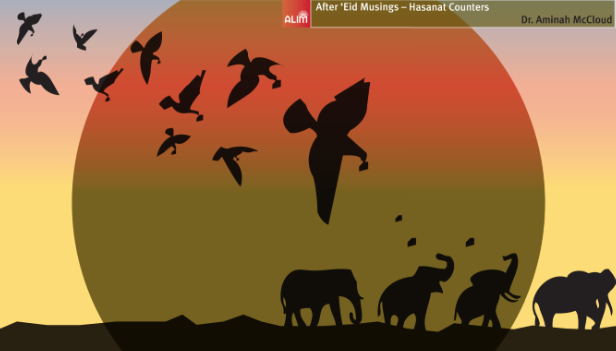|
Now that we have felt the pangs of restraint during Ramadan and hopefully found ourselves examining and interrogating our appetites, vanities and self-interests, what have we found crowding our thoughts, making us uneasy? I suspect that all in the Muslim community are suffering from an undiagnosed and certainly untreated fear of ‘what next.’ I have thought a lot about Surat Al-Fil (105). What are the elephants in American society looking to destabilize/eradicate in the Muslim community? The elephants in the front line of attack bring Islamophobia in all of its ugliness. We all know the narratives – good Muslims v bad Muslims; Muslim women continue to be oppressed; all Muslims are potential terrorists and so on. The first narrative consists of the dichotomy of good and bad Muslims tramples the First Amendment and Civil Rights of Muslim-American citizenry. Mahmood Mamdani first introduced us to the fallacy of this dichotomy in 2005 (Good Muslim, Bad Muslim: America, the Cold War, and the Roots of Terror). Who are these good Muslims? Are they Muslims whose acts please God? Those who stand up for justice and against wrongdoing? Or are the good Muslims those whose self-interests trump any Islamic obligation? Are they are those who raise suspicions about other Muslims? Are they those who feel compelled to be at the side of power for fear of detention, deportation, loss of family status?
Who are those labeled the bad Muslims? It seems as though the bad Muslims are those who stand up against tyranny, who decry some aspects of US Foreign Policy, and those who refuse to relinquish Islamic practices. Using our powers of discernment (ability to judge well), is any of this worth our attention? Of course some of it is, as the well-being of our families depend on some level of ‘getting along’ or ‘playing well.’ The question is however, when do we realize that the categories for survival are so superficial and ambiguous that the determiners can change their definitions at will? Then what do we do? Slavery to the whims of a capricious master is bondage indeed. Glen Greenwald in a May, 2013 article talks about some of those whims and asks some incisive questions about the shape-shifting that is afoot. “What definition of terrorism includes this horrific act of violence (the beheading of a British soldier) but excludes the acts of the US and its allies?” When are acts of violence, terrorist acts? Obviously when the U.S. murders Muslim civilians, the killing does not rise to the level of terrorism even if the victims bore no arms, were children and were asleep. Well, this is covered under some definitions of the War Against Terror as they are considered enemies of the U.S. who clearly is at war. Greenwald asks, what if soldiers are killed since the world is a battleground? How do we evaluate? This sura invites us to recognize a tipping point and move even more decisively to change the narrative. The tipping point is that ‘magic moment when an idea, trend, or social behavior crosses a threshold, tips, and spreads like wildfire.’ We are at a tipping point as evidenced in Greenwald’s article. The responsible rhetoric about Muslims and Islam has begun to peek out of the closet. We must ask questions! We must not be afraid to question shape shifting. We must also continue our critiques of government policies that are not good for America, and we must critique across the board – home foreclosures, high cost of education, voting rights violations, unwarranted surveillance of citizens, racial profiling in addition to our foreign policy concerns. We are the birds with the stones (metaphorically), who can join others to move America in a direction that works for all of its citizens and against the elephants and their companions. And last but not least, we must take care of our mental health. We are a community of faith that has been under siege for over a decade with ever changing boundaries and rules. Our families have weathered incredible mental stress where ‘good’ Muslims are dying in record numbers. We must stop apologizing for being Muslim citizens and celebrate our differences with positive actions on all fronts. WE have let the Companions of the Elephants turn us against each other in ideological wars. While Syrians were dying, I read Islamic and Middle Eastern scholars debating clitorectomies, polygyny, and just about anything worthy of a good distanced scholarly debate, but not the parameters of war or the Elephant and its Companions. ——- Dr. Aminah McCloud is Professor of Religious Studies and Director of Islamic World Studies program at DePaul University. Her areas of expertise include Islam in America, Muslim women, Islamic studies and the history, geography, politics, religion and philosophy of Islam. Dr. McCloud is a guest scholar and contributor. Her views and opinions do not necessarily reflect the views of ALIM, its scholars, board members and employees. Email your comments and questions to [email protected]. ALIM needs your help. If you enjoy the content that ALIM regularly produces, please support by donating monthly here.
0 Comments
Leave a Reply. |
|
stay connected
@alimprogram
PO Box 871785 Canton, MI 48187
(734) 956-0698
(734) 956-0698
2024 © American Learning Institute for Muslims. All rights reserved.
ALIM is a 501(c)(3) organization. All donations are zakat-eligible and tax deductible. Our EIN is 38-3633579.
Zelle: [email protected]
Terms of Service | Privacy Guidelines | Sign Up for ALIM Emails I Get ALIM Text Alerts
ALIM is a 501(c)(3) organization. All donations are zakat-eligible and tax deductible. Our EIN is 38-3633579.
Zelle: [email protected]
Terms of Service | Privacy Guidelines | Sign Up for ALIM Emails I Get ALIM Text Alerts


 RSS Feed
RSS Feed